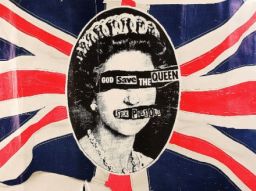Editor’s Note: Leading Women connects you to extraordinary women of our time. Each month, we meet two women at the top of their field, exploring their careers, lives and ideas.
Story highlights
British fashion designer, Vivienne Westwood, scales back business for environment
72-year-old 'grandmother of punk fashion' says people should curb consumption
Shaves head in a bid to raise climate change awareness, and embrace old age
Vivienne Westwood is as bald as a baby, the faintest hint of downy white hair sprouting across her naked scalp.
Painted pink eyebrows sweep dramatically outwards. Wearing a sparkling, woven brown dress resembling an expensive hessian sack, she totters onto the stage at London’s Southbank arts centre.
Straining forward in her chair, the 72-year-old “grandmother of punk fashion” appears both vulnerable and fierce. Fragile and yet fearless.
“The world was so mismanaged and we hated the older generation because they weren’t doing anything about it,” she says about forging Britain’s punk aesthetic with then-boyfriend and Sex Pistols manager Malcolm McLaren in the 1970s.
“I don’t hate the older people now – I’m one of them. But I’ve been trying to do something to change things all my life.”
‘God Save the Queen’
Decades after the couple started their radical new clothes shop in an area of London called “World’s End” – displaying ripped t-shirts, rubber curtains, and even a live rat in a cage – Westwood has become one of Britain’s most prestigious fashion designers.
This is the woman who, after receiving an award from Queen Elizabeth II in 1992, famously twirled around for photographers – without wearing any underwear under her skirt.
The provocative lady is still there, though a little more frail-looking these days, speaking at London’s annual Women of the World Festival.
“Buy less, choose well, make it last,” she tells a crowd of hundreds – mostly women – patiently listening to a lecture that meanders into climate change, banks, and social responsibility.
Campaign culture
Westwood appears almost reluctant to talk about the “superficial” fashion industry she has conquered in a career spanning four decades.
“We face mass extinction,” she says. “It’s being hidden from us because our rulers still pursue their own vested interest, they’ve been trained to think that the people do not understand what’s good for them.”
Her trademark head of fiery red hair has been shaved off, not for style – but to draw attention to climate change.

Westwood says she now plans to downsize her hugely successful clothing empire, in a bid to promote environmental sustainability.
“I’ve got too much product,” she says. “I’m trying to completely reduce the scale of operation. I’m concentrating on quality, not quantity.”
What about those people who can’t afford her designer clothes?
“It is difficult for people. But I think it’s not good to just go to a supermarket and come back with bags and bags of cheap t-shirts.”
“All this consumption is not a real choice.”
Made in Britain
Born in Derbyshire, in north west England, during World War Two, Westwood’s mother was a weaver in a cotton mill, while her father came from a family of shoemakers.
As a teenager in the 1950s, she would alter her school uniform into fashionable pencil skirts. Later, she worked as a teacher.
But it was through meeting Sex Pistols manager Malcolm McLaren in the 1960s – who became the father of her son Joseph Ferdinand Corré in 1966 – that she really embraced punk rock.
The couple’s south west London shop – which at various times was named “Let it Rock,” “Sex,” and “Seditionaries - Clothes for Heroes” – sold everything from rubber fetish gear to pirate outfits.

“The country was a morass of beige and cream Bri-Nylon and their shop was an oasis,” said Marco Pirroni of band Adam and the Ants.
“It took great liberalism and bravery to wear rubber in the street. If you shopped there, you didn’t go anywhere else.”
Noughties Westwood
Cast your eye across the most glamorous red carpet events in the world today and you’ll likely to see a Westwood design – be it Lily Allen’s princess dress at the BAFTAs or Pharrell Williams’ cowboy hat at the Oscars.
Regardless of her huge success, Westwood still talks of fighting the establishment. “I used my fashion as a platform to talk politics,” she says.
“When you’re a fashion designer you sort of design in a capsule. This is how you want people to be, like they are at the moment, but better.”












